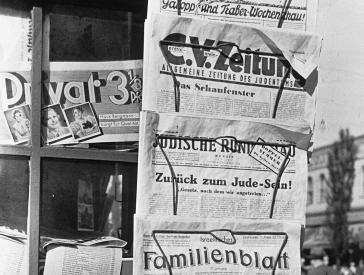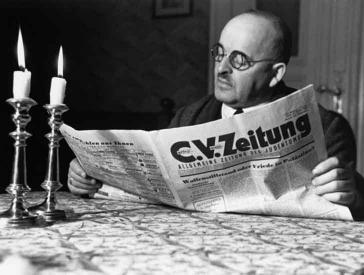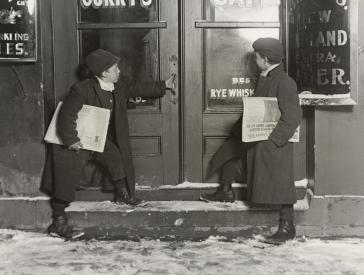Special Exhibitions and Cultural Program in July, August and September 2012
Press Information
Press Release, Wed 20 Jun 2012
For just a few more weeks the special exhibition "Berlin Transit" will offer glimpses into a forgotten chapter of Berlin´s migration history: in the 1920s immigrants from Eastern Europe spurred a heyday of Jewish culture in Berlin. The exhibition draws a multifaceted portrait of this time and its protagonists. As a special highlight towards the end of the exhibition, Alan Bern & the All Star Band will bring the record label Semer´s music back to life. In their concert on 12 July the musicians will play, reinterpret and remix the songs of the label that used to be based in the Scheunenviertel. Starting in September, the new special exhibition R.B. Kitaj (1932-2007) "Obsessions" will provide the first comprehensive overview of the painter R.B. Kitaj´s oeuvre after his death in 2007. The exhibition features about 130 works of the painter and will offer insights into his text and picture archive for the first time. Just in time for the start of the summer vacation we would like to call attention to a potentially lesser known practice of the Jewish Museum Berlin: on the first Saturday of every month admission is free for all visitors under 18 years of age.
- Kontakt
-
Press office
T +49 (0)30 259 93 419
presse@jmberlin.de
- Address
Jewish Museum Berlin Foundation
Lindenstraße 9–14
10969 Berlin
Special Exhibitions
23 March to 15 July 2012
Berlin Transit
Jewish Immigrants from Eastern Europe in the 1920s
For four more weeks the exhibition "Berlin Transit" will provide insights into life in the historic Scheunenviertel and "Charlottengrad" in the 1920s, a decade during which Berlin became a center for Jewish migration in Europe. After World War I the city served as a safe haven and way station for tens of thousands of Jews from Eastern Europe – mostly refugees of the war, pogroms or the revolution – from Russia, Lithuania or Galicia. With multiple ties to other communities and at home in several languages, the immigrants created a heyday of Jewish culture in the city. The exhibition invites the visitor to discover the traces and fragments that this diverse chapter of Berlin´s immigration history has left behind – with the help of pictures, books, audios, family memorabilia, paintings and films from this time.
An exhibition of the Stiftung Jewish Museum Berlin in cooperation with the research project "Charlottengrad and Scheunenviertel. Jewish immigrants from Eastern Europe in Berlin in the 1920s and 30s" at the Eastern Europe Institute of the Free University of Berlin. Further information can be found on www.jmberlin.de/berlin-transit/en.
Location: Old Building, first level
Admission: 4 €, reduced rate 2 euros
Guided tours: every Sunday at 2 pm
20 April extended to 26 August 2012
Russians Jews Germans
Photographs by Michael Kerstgens Since 1992
The influx of Jews from the states of the former Soviet Union since the 1990s has profoundly transformed the image of Jewish communities in Germany. Michael Kerstgens is one of the few photographers to have documented this process over a longer period of time. In his works he deals with the social and religious challenges of Jewish immigrants, as well as the situation of the "long-term residents". Religious celebrations and social activities of the Jewish communities, everyday scenes in transitory dorms and private moments of individual families are captured in Kerstgens´ compassionate pictures. The photos address leave-taking and new beginnings, arriving and remaining, the search for a sense of belonging and the importance of religious tradition.
Location: Libeskind Building, ground level, Eric F. Ross Gallery in the permanent exhibition
Admission: with the museum ticket (5 €, reduced rate 2.50 euros)
21 September 2012 to 27 January 2013
R.B. Kitaj (1932-2007) "Obsessions"
The American artist R.B. Kitaj was one of the pioneers of a new figurative style of painting in the 1960s. Together with his artist friends David Hockney, Lucian Freund and others he initiated the escape of art from abstraction. Kitaj´s works are considered to be multi-layered and provocative, characterized by their strong colors and an abundance of pictorial citations. This fall the Jewish Museum Berlin will show about 130 of Kitaj’s works from all periods of his oeuvre, bringing together loans of leading museums and private collections from around the world in this first retrospective exhibition since his death five years ago. This is the first exhibition that will provide insights into Kitaj´s private archive of texts and pictures which served as an inspiration for his paintings and collages.The artist´s life oeuvre is presented in ten theme rooms. Two rooms are dedicated to Kitaj´s analysis of his Jewish identity – a personal obsession of the artist, which inspired the name for the exhibition.
An exhibition of the Stiftung Jewish Museum Berlin in cooperation with Kulturprojekte Berlin GmbH.
Opening night: Thursday, 20 September 2012, 7 pm
Location: Old Building, first level
Admission: 4 €, reduced rate 2 euros
Accompanying Program to the Special Exhibition "Berlin Transit"
12 July
Alan Bern & The All Star Band
A Premiere
Semer reloaded: The music pioneer Alan Bern has put together an all-star band of Jewish music that is second to none just for this evening. Lorin Sklamberg, lead singer of the legendary band "The Klezmatics", Paul Brody, Daniel Kahn and many others play, reinterpret, and remix the songs of the record label "Semer" from the Berlin Scheunenviertel of the 1930s. A Red, Hot & Blue of Jewish music.
Alan Bern (musical director, piano, accordion), Lorin Sklamberg (vocals, accordion), Paul Brody (trumpet), Martin Lillich (bass), Mark Kovnatskiy (violin).
With special guests Daniel Kahn, Sasha Lurje and Fabian Schnedler.
Location: Glass Courtyard, ground level, 8 pm
Admission: 15 €, reduced rate 10 euros
Bookings (for non-journalists) on tel. +49 (0)30 25993 488 or reservierung@jmberlin.de
Monday Movies accompanying the exhibition "Russians Jews Germans"
9 July
Kaddish for a Friend by Leo Khasin
(D 2011; 94 Min., OV with Russian subtitles).
In a Palestinian refugee camp,14-year-old Ali has learned to hate Jews. Now he lives in Kreuzberg and his neighbor is an old Russian Jew. After he breaks into the Russian’s apartment Ali must face deportation – unless he is able to persuade his "enemy" to withdraw the charges.
Location: Old Building, second level, Great Hall, 7.30 pm
Admission free
Ticket reservation (for non-journalists) on tel. +49 (0)30 25993 488 or reservierung@jmberlin.de
Cultural Summer Program
"Jazz in the Garden"
1 July
Shai Maestro Trio
1 July
Shai Maestro Trio
As a particularly nimble-fingered and imaginative pianist, Shai Maestro already caused a stir in Avishai Cohen’s band. After five years together, Shai Maestro – an Israeli artist who lives in New York – took his step into the limelight with his own trio in 2011. For "Jazz in the Garden", Shai Maestro performs as part of his European tour at the Jewish Museum Berlin with Peruvian bassist Jorge Roeder and Israeli drummer Ziv Ravitz.
Shai Maestro (piano), Jorge Roeder (bass), Ziv Ravitz (percussion)
22 July
Ekkehard Wölk Trio
The unbeatable combination of classical music and modern jazz improvisation is the Ekkehard Wölk Trio’s hallmark. The three musicians create a revival that is quite unique with new interpretations of works by Bach, Mozart, Weill and Eisler. Ekkehard Wölk transforms the supposedly familiar in this live experience.
Ekkehard Wölk (piano), Johannes Fin (bass), Andrea Marcelli (percussion)
5 August
Max Doehlemann Trio Featuring Kehilot Sharot
The Max Doehlemann trio presents two Piyut singers from Israel in an unusual collaboration. Traditional Jewish songs and melodies from Turkish, Kurdish and Iraqi traditions meet the trio’s contemporary jazz. Max Doehlemann, organizer of the Jewish cultural salon "Shkoyach!", shows his joy of musical experimentation once again and finds a resounding partner in Kehilot Sharot from Jerusalem.
Max Doehlemann (piano), Hadass Pal Yarden (vocals), Yaniv Ovadia (vocals, saz), Christian Schantz (bass), Martin Fonfara (percussion)
19 August
Max Andrzejewski’s "Hütte"
Founded by the drummer and the "Convento" jazz prize winner Max Andrzejewski, the band "Hütte" unites four extraordinarily talented artists from Berlin and Cologne. With charming, quirky sounds between contemporary jazz and original improvisation, the young band – formed only in the summer of 2011 – plays finest free jazz with wonderfully contradictory coherence.
Johannes Schleiermacher (saxophone), Tobias Hoffmann (guitar), Andreas Lang (bass), Max Andrzejewski (percussion)
All "Jazz in the Garden" concerts:
Location: Museum Garden (Glass Courtyard in the event of bad weather), 11 am to 1 pm
Admission free
Café Schmus offers picnic baskets for "Jazz in the Garden". Orders on tel. +49 (0)30 2579 6751 or cafe-jmb@koflerkompanie.com.
Parallel Program for Children: T-Shirt Workshop "My Name in Hebrew" and baking mazzah bread in the traditional wood-fired oven.
Additional Cultural Summer Program
9 August
Sharon Brauner & Band
With infectious vitality and a rousing blend of hand-made German lounge pop and Yiddish evergreens, refined by tango sounds, bossa nova, swing, and a touch of the Orient, Sharon Brown presents her new CD. The evening is dedicated to the jewels of Yiddish popular music, which Sharon Brown interprets in her very own, wonderfully charming way.
Location: Glass Courtyard, ground level, 8 pm
Admission: 18 €, reduced rate 12 euros
Ticket reservation (for non-journalists) on tel. +49 (0)30 25993 488 or reservierung@jmberlin.de
21 August
Next Generation: An Israeli-Iranian Encounter
With Ron Leshem (Israel) & Hamed Eshrat (Iran)
What drives the generation of 20-40 year olds in Israel and Iran? This question forms the background of the novel "Der geheime Basar" (The secret bazaar) written by the Israeli author Ron Leshem with the help of his Iranian friends. The idea for the novel began with a Facebook request that initiated an exciting process of sharing and mutual reflection.
An event organized by the Jewish Cultural Festival, Berlin
Location: Glass Courtyard, ground level, 7 pm
Admission: 12 €, reduced rate 8 euros
Ticket reservation (for non-journalists) on tel. 01805 570000 or www.juedische-kulturtage.org/en/
Long Museum Night
25 August
775 Berlin Years – Emigrants’ Monolog
Tour and Sound Installation
In the 1920s and 1930s, Berlin was a place of refuge to thousands of Jewish immigrants from Eastern Europe. What Berlin meant to these Jews becomes clear from texts, pictures, and music. Born in what we know as Poland today, Masha Kaléko captures the big-city feel of Berlin in her poetry. For Long Museum Night, a tour of Masha Kaléko "Emigrants’ Monolog" was designed which will begin every half hour between 6.30 and 10 pm. The poem can be heard as a sound document in the museum lobby, spoken by the actress Sophie Rois. Visitors can express their thoughts on today’s Berlin, which are then embedded into the audio document during the course of the evening, resulting in a sound installation about Berlin of yesterday and today.
6.30 to 10 pm, every half hour
Admission: with the Long Museum Night ticket
Additional Program
7 and 8 September:
Body – Diversity – Art of Living
International Conference
New approaches to the topic of "Cultural Body Images and Diversity" form the focus of this interdisciplinary conference. In intercultural discussions, movement is seen as language of transformation and therefore as an opportunity for change. Special attention is given to individual and social styles of dancing. Movement cultures of people with different biographical backgrounds and experiences open up new forms of communication and help to explore the symbolic body world of other cultures and to expand the dialogue between them.
In cooperation with the Akademie Remscheid.
Location: Old Building, second level, Great Hall
7 September: 3 to 8.30 pm
8 September: 10 am to 4 pm
Conference fee: 110 €, reduced rate 90 euros
19 September
Does Racism belong in Germany? And if so, why?
A discussion featured in the new series "Visions of Belonging"
While the country is currently debating whether Islam belongs in Germany, we are asking: does racism belong in German. And to what extent is it rooted in society? The series of murders by German Nationalists that came to light in 2011 and the failure of the authorities to investigate the matter properly lent increased urgency to these questions. According to the studies of the researcher Wilhelm Heitmeyer, every other person interviewed felt that Germany was "dangerously swamped by foreigners". Almost one in three people feel "like strangers in their own country because of the many Muslims that live here". Are Germans becoming more racist? And if this is true, what is the reason for this trend? How can we deal with the phenomenon and how can we counteract it?
Discussion panel: Mehmet G. Daimagüler (lawyer and author), Mark Terkessidis (psychologist and author), Andreas Zick (Institute for Interdisciplinary Research on Conflict and Violence) and others, hosted by Ferdos Forudastan (journalist)
Consulted by Initiative DeutschPlus.
Location: Old Building, second level, Great Hall, 7.30 pm
Admission free
Bookings on tel. +49 (0)30 25993 488 or reservierung@jmberlin.de




